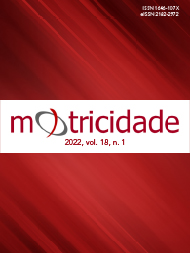Elite futsal players' perceptions of paths to expertise: A multidimensional and qualitative approach
DOI:
https://doi.org/10.6063/motricidade.23971Keywords:
expertise, psychological, talent development, transition, interviewAbstract
This study aimed to describe the perception of expert futsal players about the pathway that guides their development to expertise. Twenty-three professional futsal players from Brazil, Spain, Italy, Portugal, and Argentina were interviewed. The participants must have reached the elite in futsal by competing in professional leagues, as well as to have participated in international competitions with the national team. Six categories emerged from qualitative analysis: (1) positive influence of context, (2) Abilities/skills of the young player, (3) Educational background, (4) Training stages, (5) Key aspects of training, and (6) Retirement and post-career. Results revealed similar patterns in the pathway to expertise within futsal. Participants considered their family and coaches as key individuals in their careers. They also highlighted psychological and personal skills as the most relevant for a player to reach the elite. Furthermore, most participants considered that both unstructured play and training with better players positively influenced their careers. Our results could help coaches to adjust their long-term talent development models.
Keywords: expertise, psychological, talent development, transition, interview.
Downloads
Published
Issue
Section
License
The authors of submitted manuscripts must transfer the full copyright to Journal Motricidade / Sílabas Didáticas Editions. Granting copyright permission allows the publication and dissemination of the article in printed or electronic formats, and copyrights start at the moment the manuscript is accepted for publication. It also allows Journal Motricidade to use and commercialise the article in terms of licensing, lending or selling its content to indexation/abstracts databases and other entities.
According to the terms of the Creative Commons licence, authors may reproduce a reasonable number of copies for personal or professional purposes, but without any economic gain. SHERPA/RoMEO allows authors to post a final digital copy (post-printing version) of the article on their websites or on their institutions' scientific repository.


